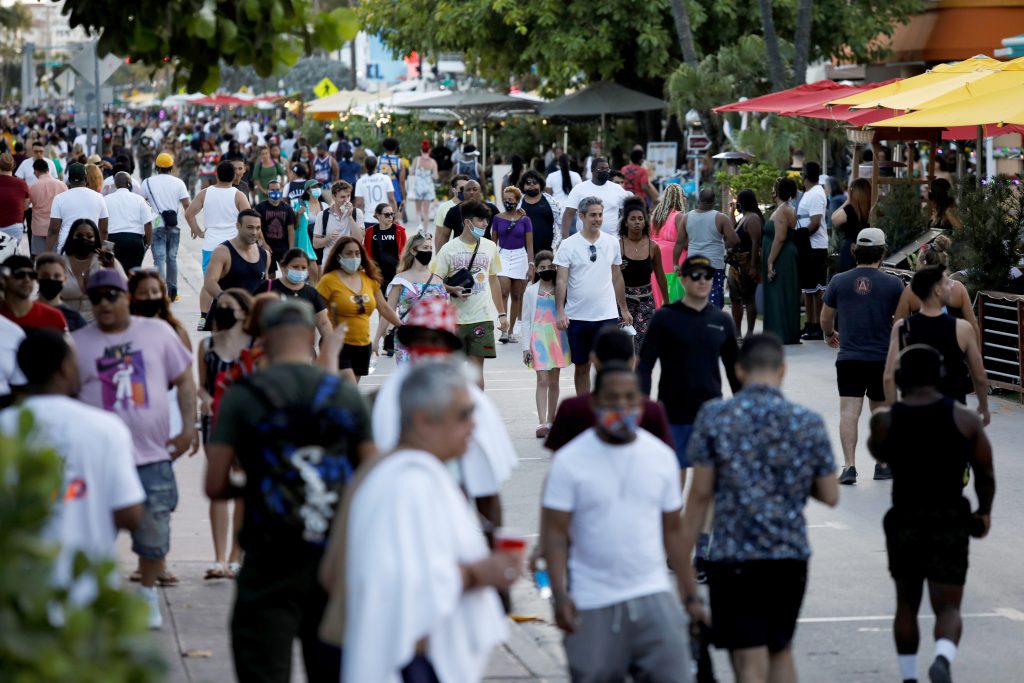There is an old Irish joke about a husband who drank too much (is there any other kind of Irish joke?) and went to church too little. His wife gave him an ultimatum: If he were late for Mass one more time, she would leave him. And so, after an all-night bender, the husband is driving his car, rushing to make the 7:30 a.m. Mass. When he arrives at the parish, he finds the parking lot is packed, throwing him into a full-blown panic.
The husband begins to pray desperately. If you help me find a parking space before Mass starts, he promises God, I will stop drinking and never be late for Mass again. He then turns a corner and sees a parking space right next to the church door.
He immediately looks skyward and says, “Never mind … I found one.”
That joke came to mind when I watched news reports of spring break revelers making fools of themselves in Florida in recent weeks. Even beyond making a strong case for revoking the right of 18-year-olds to vote, the headlines offered an instructional story for us all.
I would wager that a year ago, many of these same young people were hunkered down in their parents’ basements, worried sick about getting sick. Though they could not get inside the business end of a church even if they wanted to, they may have been looking skyward and asking for deliverance from the ravages of the pandemic when it was in full flower and filling up intensive-care units in hospitals from coast to coast.
We were all in that same place a year ago, and many of us were probably having that same kind of conversation with God (or monologue in most cases) that the man in the joke was having. We promised all manner of amendments of wayward ways in exchange for deliverance from harm. We would be good if God would just do this one thing for us.
But now science has come to our rescue. Certain doctors have become famous and even revered by many. Thanks to their emergency approval, the vaccines are becoming so plentiful, even I can now get one. Pharmaceutical salvation is now at hand, and there is a kegger at the beach to get to.
The young people in Florida were being young people in Florida during this time of year (I shudder to think of my college-aged self and the foolishness I exhibited on a regular basis). But the boorish behavior aside, what took place in Florida may also be a harbinger of a return to normalcy.
Normalcy — that is a loaded word in the age of COVID, but things are beginning to look like they are turning for the better.
Baseball is back and many stadiums in the first week of play have had real human beings in the seats rather than cardboard cutouts.
The Dodgers will allow limited numbers of fans to return to Chavez Ravine, but it is unlikely my family will be attending a game anytime soon, seeing that seat prices online are comparable to the national debt of Lithuania.
The freeways are returning to their pre-COVID orientation, with drivers experiencing higher volumes of traffic and lower patience thresholds.
Whatever form normal takes — and I believe it is inevitable that normal will never look the same again — we must all face that same temptation the kids in Florida and the man in the Irish joke succumbed to. It is the tendency we all have to call on God when there is a crisis and then conveniently put God back into our pockets and go about our lives when things seem less scary.
There is little effort involved in getting in touch with God on the deck of the Titanic when it is about to slip under the sea. The harder trick is to keep God first and foremost in our thoughts and in our lives when times are good.
I am certain the 10 lepers from Scripture sought God’s assistance for years as they suffered in a leper colony outside the city walls. But when their deliverance came in the form of Jesus, only one came back to praise and honor the Lord while the other nine lepers went back to their normal.
As this pandemic, through the grace of God, continues to wane, may our normal never be without God in front of us, God behind us, God on our right and God on our left.

